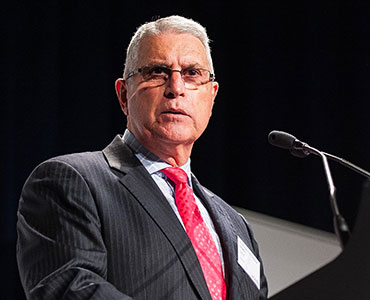For States to deliver, they must collect: CEDA
REVENUE is holding State Governments back on delivering better outcomes for Australia, according to a new report by the Committee for Economic Development of Australia (CEDA).
The report, A Federation of the 21st Century, recommends State Governments develop or gain control of revenue systems specifically serving schools, health, public transport and roads and better outcomes will result.
CEDA chief executive Stephen Martin also recommended a series of conventions across Australia to help engage the public in reforming Australia’s Federation. He said the CEDA research report, A Federation for the 21st Century, found Australia’s excessive vertical fiscal imbalance was one of the key issues undermining the positive aspects of the Federation.
“We need to move away from State Governments being held to ransom by the Federal Government and match service delivery responsibility with funding,” Professor Martin said. 
“Currently, for example, the Federal Government fails to deliver suitable levels of funding for transport infrastructure because while it collects the majority of revenue, it is not responsible for delivery.
“Distribution of Federal Government funding to the states in areas vital for the economic and social wellbeing of Australians, such as health and education, should not be swayed by politicking.”
Prof. Martin said a key focus of the Federal Government review of the Federation should include examining the distribution of government revenue and ensuring clearly defined levels of responsibility among the different tiers of government.
CEDA’s report suggests a range of options to align revenue and expenditure requirements such as:
- Assigning a fixed portion of income tax to states for funding schooling.
- Allowing State Government’s to develop a comprehensive land tax or property charge with funds raised to be used specifically for public transport.
- State Government’s extending road-use charging and receiving the fuel taxes collected by the Commonwealth, specifically to build and maintain roads.
Prof. Martin said the report examined a range of different approaches for reform as it was likely the best outcomes would be achieved not by a single solution but by a combination of different approaches.
Another key recommendation was to further extend activity based funding reforms in education, health and welfare.
“The reforms to hospital funding in Victoria are a good example of how this can work well, with hospitals now funded on the individual activities undertaken rather than individual hospitals having to lobbying for an overall amount at the start of each year,” Prof. Martin said.
“This has resulted in a much more efficient delivery of services and it is very disappointing that the rollout of this approach to other states has been stalled due to the Federal Government removing funding promised by the previous government in the May Federal Budget.
“Reforms need to focus on making government funding more citizen-focused and able to deliver the services and infrastructure Australians need.
“While the Australian Federation has largely worked well, delivering political stability and economic prosperity for over a century, it can do better.”
In addition to making recommendations around changes to revenue allocation and collection, Prof. Martin said it was important to ensure ownership of any changes by the Australian public.
Prof. Martin said there were two other key recommendations in the report, leading with the creation of a Federation Reform Council “to monitor and evaluate the effectiveness of reforms to Australia’s Federation and make sure there were no unintended consequences”.
The report also suggested a series of Federation conventions be held in conjunction with the white paper process, “to encourage the participation of as many people as possible in what must be a significant national conversation on this issue”.
“Reforming the Federation has been a recurrent issue and is once again a priority on the national agenda with the Federal Government White Paper due next year,” Prof. Martin said.
“However, the federalism debate has had the best outcomes when it has engaged the imagination of the broader population, which is why it is vital that discussion around reform is much broader than in the halls of Federal and State Parliaments.”
The report includes contributions from 19 experts from academics to former politicians such as ex-Australian Native Title Tribunal chair Fred Chaney, Victorian Premier John Brumby and the first female Lord Mayor of Sydney, Lucy Hughes Turnbull.
An indication of the broad support the CEDA report has already gathered was also illustrated by the attendee list at its Sydney launch, which included former NSW Premier Nick Greiner, Justice Duncan Kerr of the Federal Court of Australia, and Institute of Public Administration national president Terry Moran, who was also a contributing author.
A series of events are planned nationally by CEDA to introduce the report.
A Federation for the 21st Century can be downloaded from the CEDA website, www.ceda.com.au.
Ends

